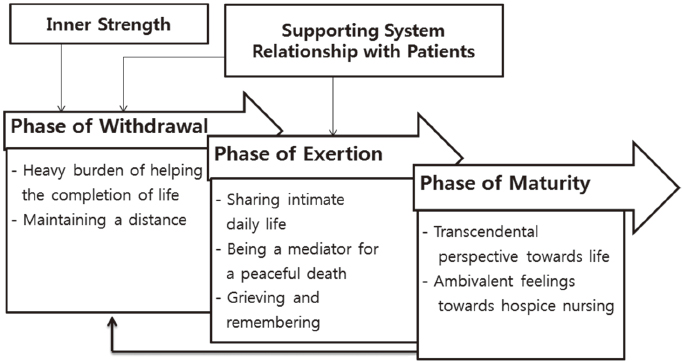Asian Oncol Nurs.
2015 Dec;15(4):264-275. 10.5388/aon.2015.15.4.264.
Hospice Palliative Nurses' Experience of Caring for Terminal Cancer Patients
- Affiliations
-
- 1College of Nursing, Kosin University, Busan, Korea.
- 2Department of Nursing, Changshin University, Changwon, Korea.
- 3Department of Nursing, Choonhae College of Health Sciences, Ulsan, Korea. imgumhee@hanmail.net
- KMID: 2168735
- DOI: http://doi.org/10.5388/aon.2015.15.4.264
Abstract
- PURPOSE
The purpose of the study was to explore and describe hospice palliative nurses' experience of caring for terminal cancer patients.
METHODS
Eleven hospice palliative nurses participated in the study. Data were collected through individual in-depth unstructured interviews with participants from November, 2012 to October, 2013. Theoretical sampling was used to the point of theoretical saturation. Data were analyzed using Corbin and Strauss' 'Grounded Theory Method.'
RESULTS
From open coding, 25 sub-categories and 12 categories were identified. Analysis revealed that the core category was 'becoming stepping-stones between life and death enduring burdens', consisting of three phases: the phase of withdrawal, the phase of exertion, and the phase of maturity. Through this process, participants utilized various action/interactional strategies such as 'maintaining a distance', 'sharing intimate daily life', 'being a mediator for a peaceful death', 'grieving and remembering'. The consequences of these strategies were a transcendental perspective towards life and ambivalent feelings toward hospice nursing.
CONCLUSION
In-depth understanding of the hospice palliative nurses' experience of caring for terminal cancer patients will guide nurse managers and policy makers to promote effective nursing strategies to better support hospice palliative nurses.
Keyword
MeSH Terms
Figure
Cited by 1 articles
-
Delivery Room Nurses' Experiences of Caring for Stillborn Babies and Their Parents
Hye Young Jang, Chae Weon Chung
Korean J Women Health Nurs. 2017;23(3):166-180. doi: 10.4069/kjwhn.2017.23.3.166.
Reference
-
1. Statistics Korea. http://www.index.go.kr/potal/main/EachDtlPageDetail.do?idx_cd=27705. Accessed September 1, 2015.2. National Cancer Center. http://hospice.cancer.go.kr/home/contentsInfo.do?menu_no=443&brd_mgrno. Accessed September 8, 2015.3. Leou CS, Kim KG, Kim JH. Factors associated with burnout of nurses working for cancer patients. Korean J Hosp Palliat Care. 2005; 8(1):45–51.4. Kwon IG, Hwang MS, Kwon KM. Quality of life of the terminal cancer patients receiving home care nursing. J Korean Clin Nurs Res. 2008; 14(2):103–114.5. Lee JH, Park JI, Kang JH, Youm JH, Koh DH, Dwon KS. Needs assessment for the beneficiaries of home-based cancer patients management project. J Agric Med Community Health. 2011; 36(4):238–250.
Article6. Kim DS, Park HS, Kim JA, Choi JH, Park MJ. A study on nurses, doctors and hospice volunteers's perception of the hospice care and advanced directives about the terminal cancer patients. Glob Health Nurs. 2012; 2:82–93.7. Lambert VA, Lambert CE. Nurses' workplace stressors and coping strategies. Indian J Palliat Care. 2008; 14(1):38.
Article8. Schaffer M, Norlander L. Being present: a nurse's resource for end-oflife communication. Indianapolis: Sigma Theta Tau;2009.9. Sobo EJ, Bowman C, Gifford AL. Behind the scenes in health care improvement: the complex structures and emergent strategies of implementation science. Soc Sci Med. 2008; 67(10):1530–1540.
Article10. Choi AS. The experience of nursing care for dying patients in new nurses [Master's thesis]. Seoul: Kwandong Univ.;2002.11. Kim YH. A study of nurses burden and attitude on terminal cancer patients. J Korean Oncol Nurs. 2001; 1(1):65–74.12. Jo KH, Kim MJ. The perception of suffering by hospice nurses. J Korean Acad Fundam Nurs. 2001; 8(1):35–50.13. Kang SY, Lee BS. The lived experience of nursing care for the dying patients in clinical nurses. J Korean Acad Nurs Adm. 2001; 7(2):237–251.14. Yi M. Nurses' experience of caring for dying patients in hospitals. J Korean Acad Nurs. 2003; 33(5):553–561.
Article15. Corbin J, Strauss A. Basics of qualitative research 3e. London: Sage;2008.16. Lincoln YS, Guba EG. Naturalistic Inquiry. London: Sage Publications;1985.17. Kim HJ, Gu JI, Byun JH, Kim SM, Choi HS. Nurse's experience of changing role in the hospice unit of medical ward. Korean J Hosp Palliat Care. 2008; 11(1):30–41.18. Lazarus RS, Folkman S. Stress appraisal and coping. New York: Springer Publishers;1984.19. Noh JH, Eom JY, Yang KS, Park HS. New nurses' experience on care of dying patients. Qual Res. 2009; 10(1):51–62.20. Kang HJ, Bang KS. Neonatal intensive care unit nurses' experience in caring for infants who are dying. Child Health Nurs Res. 2013; 19(4):252–261.
Article21. Shin MH, Shin SR. Predictors of burnout among oncology nurses. Asian Oncol Nurs. 2003; 3(1):75–84.22. Kim JH, Lee HK. Cancer unit nurses' end-of-life care-related stress, understanding and training needs. Korean J Hosp Palliat Care. 2012; 15(4):205–211.
Article23. Kang SY, Koh MH, Choi JS. The experience of hospice nurses on spiritual care: the process of untying a knot of mind. J Korean Oncol Nurs. 2008; 8(2):111–119.24. Wu HL, Volker DL, editors. Living with death and dying: the experience of Taiwanese hospice nurses. Oncol Nurs Forum. 2009; 36(5):578–584.
Article25. Jo KH, Kim YK. The influencing factors on the degree of nurse's suffering experience caring for terminal cancer patient. Korean J Adult Nurs. 2004; 16(3):378–387.26. Lee HR, Lee YO, Choi EO, Park YM. A comparison on stress and coping of bereavement care between nurses in the cancer unit and nurses in the general unit. J Korean Oncol Nurs. 2007; 7:26–35.27. Jo KH, Park AR, Lee JJ, Choi SJ. The influence of humanistic knowledge, hospice perception and spirituality on terminal care performance of clinical nurses. Korean J Med Ethics. 2015; 18(2):103–116.28. Mok E, Chiu PC. Nurse-patient relationships in palliative care. J Adv Nurs. 2004; 48(5):475–483.
Article
- Full Text Links
- Actions
-
Cited
- CITED
-
- Close
- Share
- Similar articles
-
- The Effect of Suffering Experience, Empathy Ability, Caring Behaviors on Terminal Care Performance of Clinical Nurses
- Clinical Experience of Nurses in a Consultative Hospice Palliative Care Service
- Policy on Hospice and Palliative Care in Korea
- The relationship between Terminal Care Stress and Knowledge and Perception of Hospice-Palliative Care among Pediatric Nurses
- Doctor's Perception and Referral Barriers toward Palliative Care for Advanced Cancer Patients


